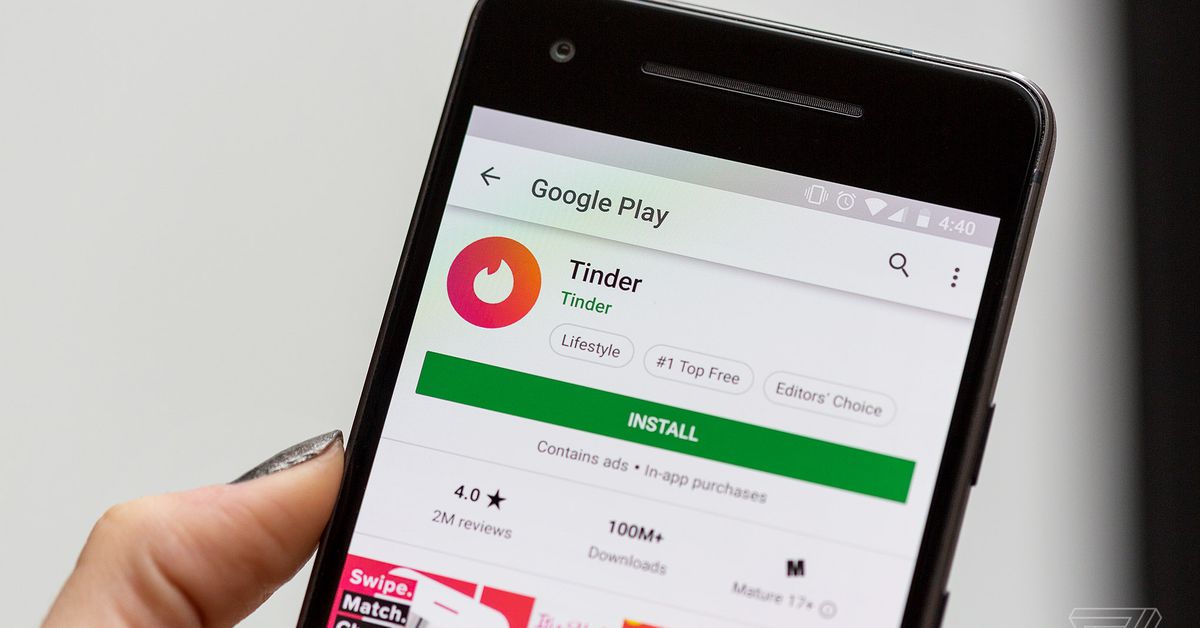
Tinder parent company Match Group has just become the latest high-profile software maker to stiff Google on its 30 percent fee for all Android transactions through the Play Store. To avoid paying the company on in-app purchases of subscriptions to services like Tinder Gold and Tinder Plus, Match Group will now encourage users to enter credit card details directly into Tinder’s systems, according to Bloomberg, citing new research by Macquarie analyst Ben Schachter.
The move is similar to one made by popular video game developer Epic Games, which last year released the Android version of battle royale hit Fortnite via its own downloadable launcher to avoid the 30 percent cut. Notably, Tinder is Match Group’s most profitable entity, and between its subscription services and other in-app purchase options like paying for the ability to know when someone has read your message, the software is often one of the highest grossing free apps on both iOS and Android.
“At Match Group, we constantly test new updates and features to offer convenience, control and choice to our users,” says Match Group spokesperson Justine Sacco in a statement given to Bloomberg. “We will always try to provide options that benefit their experience and offering payment options is one example of this.” After inputting your credit card info directly onto Tinder’s servers, the app supposedly defaults to that payment method for any in-app purchase in the future, allowing Tinder to bypass the cut indefinitely. Google was not immediately available for comment.
Epic and Match may be the only two high-profile companies to thus far openly bypass the Play Store while still trying to cater to Android users. Yet prominent subscription services like Netflix and Spotify have for years expressed distaste for the 70-30 model of modern app stores, which was put in place by Apple back in 2008 and borrowed just a few months later by Google for its Play Store.
Many companies treat the 30 percent cut as the cost of doing business, especially on iOS where you get Apple’s quality control and firm grip on its ecosystem, although some begrudgingly refer to the fee as the “Apple tax.” Even though Epic Games did bypass the Google Play store, it decided to release Fortnite on iOS through the App Store and take the hit, for instance. Android, however, is more open and therefore more flexible with how developers want to make money and reach users more directly. That’s opened the door for Epic and now Match Group to experiment.
Despite Apple’s steadfast approach to App Store fees, Spotify has filed an antitrust complaint against Apple with the European Commission looking to get changes forced by way of regulation. The EU is now in the process of investigating Apple for alleged anti-competitive tactics, with Spotify arguing that Apple’s 30 percent cut puts third-party services at a disadvantage when competing against its own offerings, like Apple Music.
For years before that, Spotify and Netflix both have come up with creative ways to push people outside the Apple and Google ecosystems on mobile to avoid having to pay the fee, occasionally capitulating to the storeowners and jacking up monthly subscription prices for mobile sign-ups as a result.
Last August, Netflix began reportedly testing a method similar in design to Tinder’s that lets users sign up directly to its service through a mobile webpage that would bypass the iOS App Store. In December of last year, Netflix stopped allowing in-app purchases of any kind for both new and existing users on iOS.
Apple has tried to make an effort to specifically appease companies that charge for subscription services, lowering its App Store fees back in 2016 from 30 to 15 percent on any service to which a user had been subscribed via the mobile app for longer than 12 months. Google joined Apple in that policy back in the fall of 2017. But it appears companies are getting more and more tired of the status quo and are considering trying to bypass the middlemen entirely.
It’s not clear whether Google will take action against Tinder for trying to skirt the store; In the past, Apple has reportedly hindered Spotify’s iOS app by restricting updates when it found out the music streaming service was trying to bypass the App Store. Google took no action against Epic, but that wasn’t a clear comparison because Tinder is still being distributed by the Play Store and technically still bound by Google’s terms. Regardless, in the event Google decides to do nothing, that could mean many more apps follow Match Group’s lead in pushing users to give the app maker, and not the Play Store, their credit card info.
https://www.theverge.com/2019/7/19/20701256/tinder-google-play-store-android-bypass-30-percent-cut-avoid-self-install

